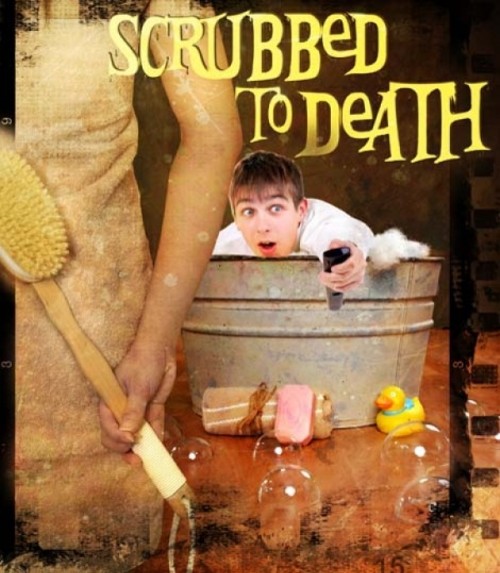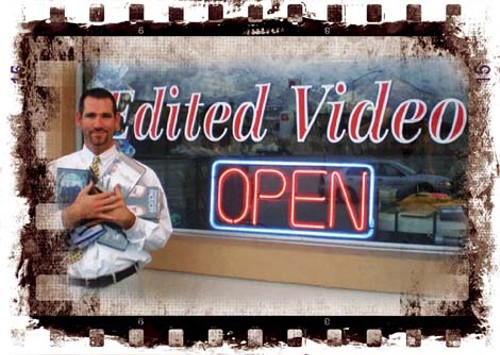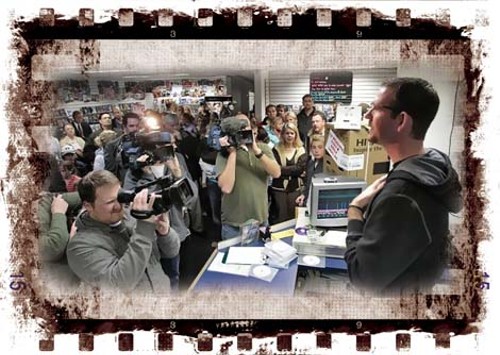CleanFlicks & Cleanflix
Scrubbed to Death: A Utah County professor thinks ‘clean’ movies are a dirty shame.
By Philip Sherman GordonThe business was a commercial success, but was named in a lawsuit, along with a number of similar businesses, by a group of major Hollywood studios and the Directors Guild of America for copyright violation. CleanFlicks and the others lost their case in federal court and were forced out of business. But, one of the CleanFlicks franchise owners stubbornly re-opened his store in the same location, under a different name, “Flix Club,” in a defiant, publicly supported act of conservative-media activism and radical civil disobedience. The local authorities never shut him down. The otherwise law-abiding patrons in Utah County kept on renting his illegally edited films.
On it went for over a year after the court case, until one day, the owner, Daniel Thompson, was arrested for paying two 14-year-old girls for sexual favors. Alcohol and Lortab pills were also found on the premises, and the Daily Herald reported that, along with the sex acts, Thompson told the girls that Flix Club was a front for pornographic film production and distribution.
Read Scott Renshaw's review of Cleanflix
It is difficult not to make jokes and wry observations. The story is so deliciously lurid, Freudian and full of irony. Talk about the return of the repressed! Poor Daniel Thompson! Perhaps he was right all along. Watching all those dirty scenes over and over will pervert one’s mind. Maybe he sacrificed his own psycho-sexual health so the rest of us could safely remain non-pedophilic monogamists. He’s like Marie Curie! Or Jesus! He got perverted for our sins, and his sacrifice means we can all watch clean movies and not get depraved, like he did.
|
|
But that story is unfair, incomplete and belies the vexing challenges of the CleanFlicks phenomenon. Should people be able to choose to watch movies with nudity or vulgar language removed if they want to? Different cherished freedoms are at odds over the question: The freedom of expression of artists and their control of their work are poised against the freedom of expression of audiences and their freedom to use their property freely, even if the original owner who sold it to them doesn’t like the way they use it. It is also tangled up with the practice of fair use of cultural texts by other artists, such as sampling in hip-hop, or parody in comedy.
Something else is at stake, too. It has to do with our collective relationships to culture, our worldviews and views of human nature. It is about the psycho/erotic/social/symbolic relationships that are intertwined with politics, big and small, from the micro-disciplinary pressures of daily community life to the macro-legitimating strategies of religious and cultural authority. Agreeing to participate as a consumer in the edited-movie business—which many, many people do—entails agreeing with and consenting to a lot of other things as well, things that are bound up with the lives of all of us, even those who think the whole CleanFlicks enterprise is utterly absurd and has nothing to do with them.
The Prophet Tells Us Not To
I love movies and I hate censorship, and the fact that CleanFlicks was cutting things out of movies in a misguided attempt to improve their morality, and that was where my new neighbors and students voluntarily went to rent their movies, filled me with dread.
It was like waking up in a Twilight Zone episode in which a group of well-intentioned people, thinking they were ensuring their and their children’s safety in the face of some infectious threat, sacrificed an important part of their humanity to live in an antiseptic dystopia so sterile it threatened to exterminate not just the pests they feared, but all the people, too.
I was repulsed and fascinated. I walked into the store one day and spoke with the manager. We were interrupted by a customer who had a question. The two of them proceeded to have a serious discussion about the artistic merits of some movies. The manager dispensed advice with the self-assured confidence of Roger Ebert. The customer acted like a discerning connoisseur of fine wine. The movies they talked about were crap. I couldn’t stand it and had to leave.
The incident was part of the initial cultural vertigo I experienced when I first moved to Utah, a significant underscore to the first time I emptied a classroom when I showed a movie. I had taught at four different universities in three different states (Illinois, Michigan and Alaska) before coming to Utah. Always, before I showed a movie in class, I offered that if a student did not want to watch the movie, he or she did not have to. It had always been a cautious courtesy, a “just in case” sort of thing, like buckling a seat belt for a crash you never expect to have. I never had students actually take me up on it, let alone half of them before a movie had started, and the rest as the film played.
I was shocked and hurt my first semester at Utah Valley University when students walked out while I was showing University of Massachusetts professor Sut Jhally’s documentary Advertising and the End of the World. It is not even an R-rated movie. It analyzes sexually suggestive ads from print and broadcast television, in part by juxtaposing them—one erotically charged ad after the other—to demonstrate the conventions of advertising, and it sent my students fleeing.
For a pop culture guy like me, who had turned my love of media into a profession and taken a job in Utah to share whatever I had to share about it, the whole CleanFlicks/R-rated movie thing was deeply disturbing and bizarre. Where was I? Mayberry, 1955? I hated the idea that some self-appointed moral guardian with a business license in Orem would take a perfectly good movie and edit out the swear words, nude scenes and whatever else he finds offensive, and that people, in America, would go watch that movie instead of the original version, and think something moral had happened!
I thought about it a lot—my students voluntarily getting their movies from CleanFlicks, as if that choice, that moment in which they become responsible for their own repression, would be the key somehow to unlocking their perspectives, their psyches, their experiences of the world and their senses of themselves within it.
Latest in Cover Story
Readers also liked…
-
Forget the family pedigree—Robert F. Kennedy Jr should not be the next president of the United States
Trojan Horse
- Jun 21, 2023
-
Women decry harassment and toxic culture at St. George auto dealership
Men at Work
- Oct 11, 2023






